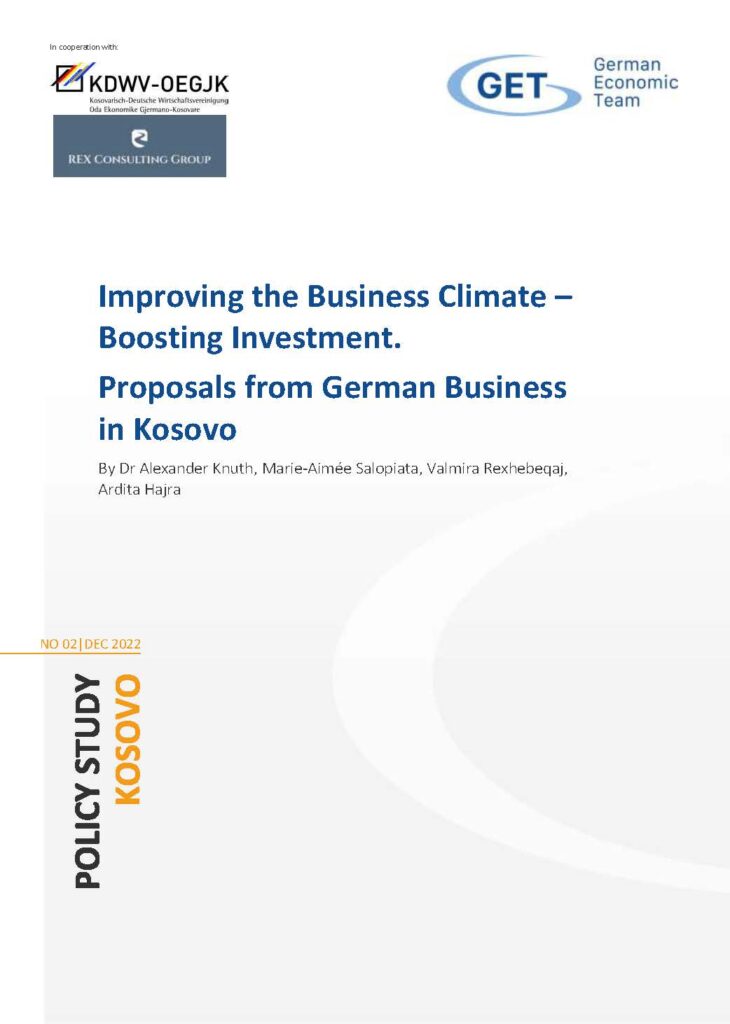Monitoring of Reform Implementation – May 2024

In Dec-22, the German Economic Team, together with the German Kosovar Business Association (KDWV) and REX Consulting, published a study in which we proposed several reforms to improve the business climate in Kosovo. This study presents the results of our monitoring of the implementation of these reform-proposals in the last one and a half years since Dec-22.
To attract investment, especially foreign direct investment, it is important to continuously improve the business climate through adequate reforms. By promoting investment which can create new jobs, these reforms contribute effectively to public welfare. Both the initial study and this update seek to support this reform process.
For the initial study from Dec-22, we visited companies from a range of sectors and asked them what barriers to growth they see and what suggestions they have for improvement. From the wealth of suggestions, we have selected four short-term and three long-term measures that were named most often by the companies.
Proposals for short-term policy measures
- Increasing the efficiency of VAT-refund
- Facilitating and fostering the installation of solar panels
- Accelerating the implementation of data protection reforms
- Facilitating the transport of goods through insurance policies
Proposals for long-term policy measures
- Reforming the system of education and vocational training
- Providing reliable infrastructure
- Building a positive track record of successful investment lighthouse projects
Since Dec-22, we have monitored the reform process closely, keeping an eye especially on progress made to tackle the problems reported in the initial study. It became clear that the administration is well-aware of reform needs and is working towards the implementation of reforms in nearly all areas identified in the initial study.
For our monitoring, we broke the seven reform-proposals down into 22 detailed recommendations, each addressing a specific problem of firms. As of May-24, for almost all of the detailed recommendations, initial steps have been taken towards implementation. Some reforms are even partially implemented already, which marks significant progress, considering the relatively short period of one and a half years.
In several dimensions, important reforms have been initiated. For example, the Tax Administration of Kosovo (TAK) has introduced a risk-based approach to tax inspections following a VAT refund claim. This significantly reduces the burden of tax inspections for reliable taxpayers. Additionally, it introduced reforms aiming to increase the speed with which VAT refund claims are processed.
Another example is the provision of a reliable feed-in limit for rooftop solar panels into the low-voltage grid by the Energy Regulatory Office, which allows companies to plan ahead and to make investments into rooftop solar panels. Notable is also the successful attraction of investments from several well-respected German companies. This helps to foster an image of Kosovo as advantageous location for European companies that seek to near-shore parts of their supply chain. © 2024 Berlin Economics | All rights reserved.
Although the reform-pace needs to be further accelerated in order for Kosovo to fully reap the benefits of current trends such as near-shoring and the communication of reforms needs to be enhanced, we can draw a positive conclusion. Reform-priorities of Kosovar officials in general align well with business needs. An important aid in this regard are the new fora for public-private dialogue, which the Prime Minister’s Office established with the support of the Swiss Government and the EBRD.
To download the study, please click the following link: GET_KOS_PS_01_2024_en